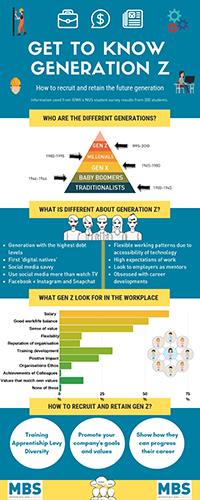Generation Z -a catalyst for change

At EMEX 2018, panellists spoke about of the importance of Generation Z and the need to be aware of what they’re looking for in a career. Renu Chopra reports
Recruitment and retention will be a top priority in 2019 for the building services industry, as Brexit threatens staffing numbers and project demands increase. Companies will need to consider attracting and training young new recruits in order to build the future.
The Charted Institute of Building Services Engineers (CIBSE) highlighted that construction needs 150,000 new recruits by 2021 due to the increased demand from largescale projects such as HS2, Heathrow Airport and the target of 300,000 new homes by 2020. EngineeringUK also released figures stating that by 2025 there will be a need for 1.8 million engineers across all fields (See MBS December 2017).
Author of the Farmer Review 2016 (Modernise or die), Mark Farmer, spoke to MBStv about the urgent need for the industry to bring in new recruits, saying: “There is a declining resiliency, we have an aging workforce. We are struggling to win the war for new talent.”
BESA president, Tim Hopkinson also said in his presidential address that: “Transformation is inevitable because the UK construction industry simply cannot deliver everything competently in a world of increasing opportunities, demands for higher standards and a shrinking pool of resource and talent.”
There is also anecdotal evidence that construction projects are being slowed because of a lack of available onsite skills – likely to be reduced further post-Brexit. So, the need to attract new talent to the industry is pressing.
 |
| Get to know Generation Z: the future of the industry |
At EMEX, the Institute of Environmental Management and Assessment (IEMA) drew attention to a joint survey it conducted with the National Union of Students (IEMA) and Ricoh on what young people are looking for from employers.
The results show that the majority of the current workforce is made up of ‘Baby Boomers’ (born between 1946 and 1964) and Generation X (born between 1965 and 1980). This cross-industry survey shows that it will be Generation Z (born between 1995 and 2010) who will effectively be the future of the industry – and it’s this generation that the industry needs to attract and retain.
Gen Z’s advanced technological skills set them apart from previous generations, calling them ‘digital natives’. This generation has grown up with technology and social media, making them tech-savvy, socially aware and entrepreneurial workers. This group is potentially very valuable to the construction sector. However, IEMA’s survey states that only 23% of UK businesses have a strategy to recruit and train staff from the younger generations. The question is, how can construction companies prepare?
Firstly, it is important to set aside generalisations that we see so often in the media. The ‘snowflake generation’ as it’s sometimes disparagingly referred to, is actually pretty hard-headed about what it wants.
The results from the joint research showed the top priorities of students looking for work are:
* 64% a good salary
* 52% a good work and life balance
* 43% value having a sense of meaning in their work
Additional findings showed that this group values employers that have a positive impact on society ,rather than the reputation of the company. This suggests many young people are more attracted to a company if they are positively contributing to society; it doesn’t have to be a household brand name.
The research shows that a top priority for job-seeking young people in this age bracket are training and development opportunities. They expect managerial colleagues to act as mentors and assist with their career progression.
Members of Generation Z have a flexible lifestyle and are not yet tied down to family commitments so they are able to work wherever, whenever. One important point to bear in mind is that the latest graduates also have no choice but to work hard to sustain themselves, being the highest dept-carrying generation.
There is no doubt that young people can be a real asset to the sector. For example, 25-yearold Reanna Evans began as an apprentice with NG Bailey and now works as their senior project engineer. She is also chair of BESA’s Future Leaders group, as well as a the recent CIBSE ASHRAE Graduate of the Year.
She acknowledges that bringing young people into a company should be viewed as a long-term investment: “To begin with, there is little benefit for the company to hire a young recruit. But if the company puts the time and effort into them in the first two years, they can push them in the areas they appear to be good at and see them shine. Young people can bring fresh new ideas and the ability to use technology.”
The good news for our sector is that Evans says that she gains tremendous satisfaction from working in the building services industry by working on projects such as hospital builings, she is helping the wider community.
It is clear that retaining and training young people will be a top priority for our sector in 2019.







